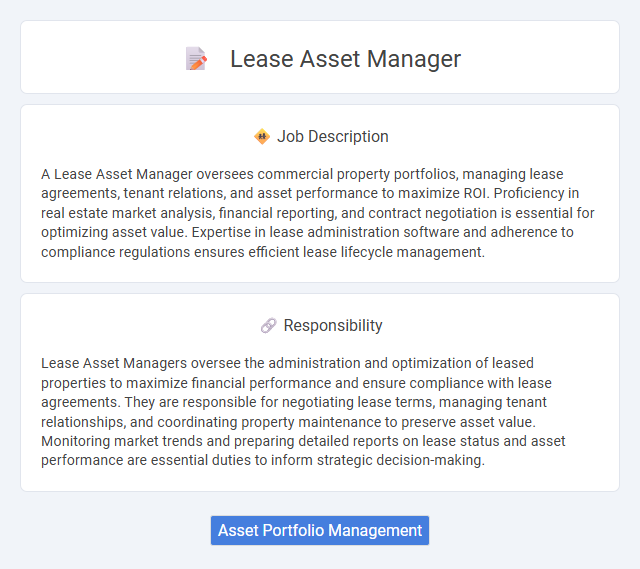
A Lease Asset Manager oversees commercial property portfolios, managing lease agreements, tenant relations, and asset performance to maximize ROI. Proficiency in real estate market analysis, financial reporting, and contract negotiation is essential for optimizing asset value. Expertise in lease administration software and adherence to compliance regulations ensures efficient lease lifecycle management.
Candidates who demonstrate strong organizational skills and attention to detail are likely to thrive as Lease Asset Managers, given the role's demand for meticulous contract management and lease administration. Individuals with effective communication abilities and a proactive mindset probably fit well, as they need to coordinate with tenants, landlords, and legal teams regularly. Those who may struggle with multitasking or lack negotiation skills might find the responsibilities of maintaining lease portfolios and optimizing asset performance challenging.
Qualification
A Lease Asset Manager must possess strong financial analysis skills and a thorough understanding of lease accounting standards such as ASC 842 and IFRS 16. Proficiency in lease management software and experience with contract negotiation are critical qualifications. Effective communication and problem-solving abilities are essential to optimize asset performance and manage tenant relationships.
Responsibility
Lease Asset Managers oversee the administration and optimization of leased properties to maximize financial performance and ensure compliance with lease agreements. They are responsible for negotiating lease terms, managing tenant relationships, and coordinating property maintenance to preserve asset value. Monitoring market trends and preparing detailed reports on lease status and asset performance are essential duties to inform strategic decision-making.
Benefit
Lease Asset Manager roles likely offer significant benefits such as enhancing portfolio performance and maximizing rental income through strategic lease management. These positions probably provide opportunities for developing expertise in asset valuation and negotiation, which can lead to career growth in real estate finance. The chance to work closely with diverse stakeholders may also improve communication skills and industry connections.
Challenge
Managing lease assets likely involves complex challenges such as balancing tenant needs with property maintenance demands and ensuring compliance with evolving regulations. The role probably requires strategic decision-making to optimize asset value while minimizing vacancy risks and operational costs. Navigating fluctuating market conditions and adapting lease agreements to maximize revenue could also present ongoing difficulties for lease asset managers.
Career Advancement
A Lease Asset Manager plays a crucial role in overseeing and optimizing property lease portfolios to maximize revenue and asset value. Proficiency in financial analysis, negotiation, and asset management opens pathways to senior roles such as Director of Asset Management or Real Estate Portfolio Manager. Mastery of lease administration software and market trend analysis enhances career advancement opportunities within real estate investment firms.
Key Terms
Asset Portfolio Management
Lease Asset Managers oversee and optimize extensive asset portfolios, ensuring maximum return on investment through strategic lease management and renewal negotiations. Their expertise includes tracking market trends, assessing asset performance, and implementing risk mitigation strategies tailored to diverse property types. Proficient in financial modeling, they enhance portfolio value by balancing lease expirations, tenant relations, and capital expenditure planning.
 kuljobs.com
kuljobs.com